2005年成人高考英语试题及答案1(高起点)
2005年成人高考英语试题及答案1(高起点)

2005年成人高考英语试题及答案1(高起点)D目录实验一熟悉MATLAB仿真软件实验二等量同号点电荷电场实验三等量异号点电荷的电势分布实验四带电粒子在均匀电磁场中运动实验五使用m语言对电磁场的仿真实验六使用偏微分方程工具箱对电磁场的仿真课程编号:11211041 课程类别:学科必修课程适用层次:本科适用专业:通信工程课程总学时:48 适用学期:第4学期实验学时:12 开设实验项目数:6撰写人:李路审核人:周昕教学院长:范立南实验一:熟悉MATLAB仿真软件一、实验目的与要求1.了解MATLAB应用开发环境2.了解MATLAB的使用方法二、实验类型验证三、实验原理及说明掌握MATLAB的基本功能。
五、实验内容和步骤在Windows窗口中用鼠标双击MATLAB图标即可进入MATLAB的工作窗口(Command Window),如图1所示。
没有图标可利用MATLAB\bin目录下的MATLAB.exe文件在桌面上建立一个快捷方式。
图1 MATLAB工作窗口退出MATLAB的方法有三种:单击工作窗口右上角的关闭按钮;用菜单File→Exit MATLAB命令;或者直接在工作窗口中输入quit后回车。
工作窗口是标准的Windows窗口形式,用户在命令窗口中输入各种指令,进行运算;在左侧的变量窗口中监控当前所创立的所有变量。
Current Directory是系统的当前工作路径,MATLAB对函数或文件等进行搜索,用户每次文件的创建、保存都在这个路径下进行。
初次启动MATLAB时系统的默认工作路径是MATLAB目录下的Work子目录,如果要改变当前的工作路径,可以单击如图2所示的路径栏右侧的,在弹出的路径选择对话框内选择想要设置的路径。
图2 工作路径栏和选择工作路径对话框六、实验数据处理与分析1MATLAB系统基本有哪五个主要部分?2MATLAB的符号运算变量如何创建?实验二:等量同号点电荷电场一、实验目的与要求1.学习了解MATLAB数据表示、运算符和表达式;2.掌握等量同号点电荷电场的分布情况。
北京成人本科英语真题2005年11月_真题(含答案与解析)-交互
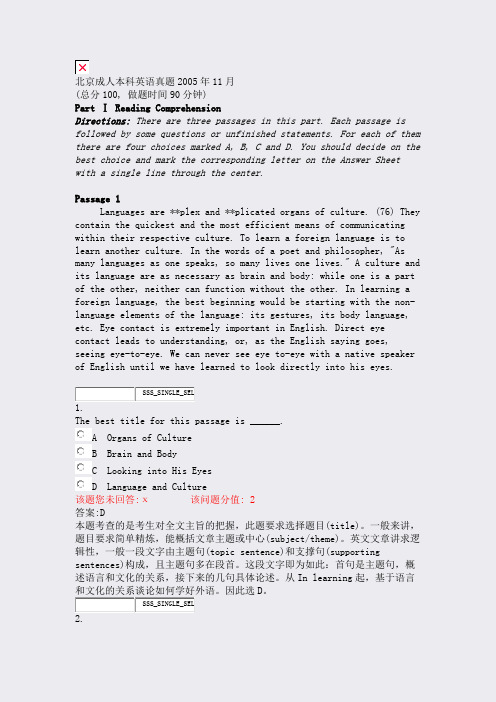
北京成人本科英语真题2005年11月(总分100, 做题时间90分钟)Part Ⅰ Reading ComprehensionDirections: There are three passages in this part. Each passage is followed by some questions or unfinished statements. For each of them there are four choices marked A, B, C and D. You should decide on the best choice and mark the corresponding letter on the Answer Sheet with a single line through the center.Passage 1Languages are **plex and **plicated organs of culture. (76) They contain the quickest and the most efficient means of communicating within their respective culture. To learn a foreign language is to learn another culture. In the words of a poet and philosopher, "As many languages as one speaks, so many lives one lives." A culture and its language are as necessary as brain and body: while one is a part of the other, neither can function without the other. In learning a foreign language, the best beginning would be starting with the non-language elements of the language: its gestures, its body language, etc. Eye contact is extremely important in English. Direct eye contact leads to understanding, or, as the English saying goes, seeing eye-to-eye. We can never see eye to-eye with a native speaker of English until we have learned to look directly into his eyes.SSS_SINGLE_SEL1.The best title for this passage is ______.A Organs of CultureB Brain and BodyC Looking into His EyesD Language and Culture该题您未回答:х该问题分值: 2答案:D本题考查的是考生对全文主旨的把握,此题要求选择题目(title)。
2005年高考英语试题·全国卷I(附答案)

全 国 卷(Ⅰ) (河北、河南、安徽、山西、海南等地区) 第一卷第一卷注意事项注意事项1. 答第一卷前,考生务必将自己的姓名、准考证号、考试科目用铅笔涂写在答题卡上。
答第一卷前,考生务必将自己的姓名、准考证号、考试科目用铅笔涂写在答题卡上。
2. 每小题选出答案后,用铅笔把答题卡上对应题目的答案标号涂黑。
如需改动,用橡皮擦干净后,再选涂其它答案标号。
不能答在试卷上。
干净后,再选涂其它答案标号。
不能答在试卷上。
第一部分:听力(共两节,满分30(分) 做题时,先将答案标在试卷上。
先将答案标在试卷上。
录音内容结束后,录音内容结束后,录音内容结束后,你将有两分钟的时间将试卷上的答案转涂你将有两分钟的时间将试卷上的答案转涂到答题卡上。
到答题卡上。
第一节第一节 (共5小题;每小题1. 5分,满分7. 51. 5分) 听下面5段对话。
每段对话后有一个小题,从题中所给的A 、B 、C 三个选项中选出最佳选项,并标在试卷的相应位置。
听完每段对话后,你都有10秒钟的时间来回答有关小题和阅读下一小题。
每段对话仅读一遍。
读下一小题。
每段对话仅读一遍。
例:How much is the shirt? A. £19. 15. B. £9. 15. C. £9. 18. 答案是B. 1. How much will the woman pay if she buys two skirts? A. $18. B. $19. C. $20. 2. What will the speakers discuss? A. A report. B. A computer. C. A report on computer. 3. What are the speakers talking about? A. A child. B. A room. C. A present. 4. What can we learn from this conversation? A. The woman does not get along well with the man. B. The woman does not get along well with her roommate. C. The man will talk with the woman’s roommate.5. Where are the two speakers now? A. On the first floor. B. On the fourth floor. C. On the fifth floor. 第二节 (共15小题;每题1. 5分,满分22. 5分) 第二节听下面5段对话。
2005年04月北京成人本科英语真题
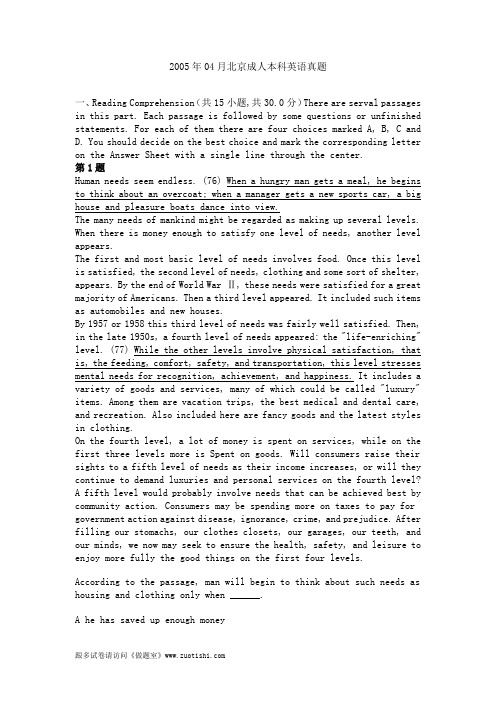
2005年04月北京成人本科英语真题一、Reading Comprehension(共15小题,共30.0分)There are serval passages in this part. Each passage is followed by some questions or unfinished statements. For each of them there are four choices marked A, B, C and D. You should decide on the best choice and mark the corresponding letter on the Answer Sheet with a single line through the center.第1题Human needs seem endless. (76) When a hungry man gets a meal, he begins to think about an overcoat; when a manager gets a new sports car, a big house and pleasure boats dance into view.The many needs of mankind might be regarded as making up several levels. When there is money enough to satisfy one level of needs, another level appears.The first and most basic level of needs involves food. Once this level is satisfied, the second level of needs, clothing and some sort of shelter, appears. By the end of World War Ⅱ, these needs were satisfied for a great majority of Americans. Then a third level appeared. It included such items as automobiles and new houses.By 1957 or 1958 this third level of needs was fairly well satisfied. Then, in the late 1950s, a fourth level of needs appeared: the "life-enriching" level. (77) While the other levels involve physical satisfaction, that is, the feeding, comfort, safety, and transportation, this level stresses mental needs for recognition, achievement, and happiness. It includes a variety of goods and services, many of which could be called "luxury" items. Among them are vacation trips, the best medical and dental care, and recreation. Also included here are fancy goods and the latest styles in clothing.On the fourth level, a lot of money is spent on services, while on the first three levels more is Spent on goods. Will consumers raise their sights to a fifth level of needs as their income increases, or will they continue to demand luxuries and personal services on the fourth level?A fifth level would probably involve needs that can be achieved best by community action. Consumers may be spending more on taxes to pay for government action against disease, ignorance, crime, and prejudice. After filling our stomachs, our clothes closets, our garages, our teeth, and our minds, we now may seek to ensure the health, safety, and leisure to enjoy more fully the good things on the first four levels.According to the passage, man will begin to think about such needs as housing and clothing only when ______.A he has saved up enough moneyB he has grown dissatisfied with his simple shelterC he has satisfied his hungerD he has learned to build houses【正确答案】:C【本题分数】:2.0分【答案解析】本题考查的是考生对文章几处细节的把握。
2005年成人高考英语试题及答案1(高起点)

安全生产制度2007年六连安全生产制度为了更好的完成各项生产工作任务,根据团安委会文件精神,特制定如下制度:一、各班组要认真学习安全生产法,深入理解,共同落实,杜绝一切安全事故在我们身上发生。
二、从业人员必须服从管理,听从指挥,服从命令,不可违反安全操作规程,出现安全事故自己将承担一切安全责任。
三、各类机动车辆必须有证有照才能行驶,严禁无照驾驶车辆,禁止无证上岗,禁止操作存有安全隐患的车辆,禁止人货混装等现象,如因上述原因造成事故,由本人承担安全责任。
四、连队职工应遵守连规民约,严禁私自接线,严禁在不安全的凉棚下做饭,如因此发生漏电伤人、凉棚起火对他人造成损害,一律照价赔偿事故损失,情节严重的交司法机关处理。
五、农药管理,库房工作人员必须戴口罩、手套,发放农药时必须交代清楚农药性质,严禁使用农药时进食、抽烟,使用过的农药废瓶等要及时深埋或销毁。
六、私营加工与租房管理,私营加工人员必须与单位签订安全协议,租房人员必须办理租赁合同,如私营加工人员伤亡,未经单位统一,责任自负,租房人员注入危旧住房,为办理租赁合同,房屋倒塌,出租人员负全责。
七、用工管理,严格执行“谁用工、谁负责、谁的片区、谁负责”的原则,如因劳动时不遵守连队规章制度和安全操作规程出现安全事故,由用人单位或个人按责任大小承担。
八、农药使用,从业人员使用农药时,必须戴好口罩,防护手套等防护用品,使用过的药瓶、药袋的剩余,交回库房由保管妥善保存好,如不按规定办理,发生事故由当事人承担责任。
九、以上制度请大家共同遵守,如有违反,按本条款进行处理。
六连安全生产领导小组2007年3月开展“三无、三不、三好”活动守则2007年六连开展“三无、三不、三好”活动守则为了确保连队生产工作安全有效、稳定发展,六连安全生产领导小组特制定守则如下:一、连队干部职工群众认真学习“安全生产法”杜绝各类事故发生,人人做到“个人无违章,身边无三违,群众无伤害”的安全原则,处处以人为本,为人而想己,为己而想人,把安全生产思想放在心上,记在脑里。
成人英语三级考试_2005年6月浙江成人学士学位英语考试真题及答案
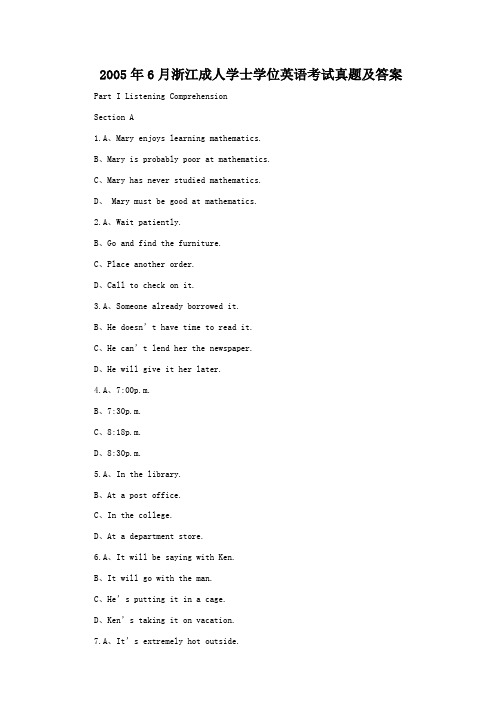
2005年6月浙江成人学士学位英语考试真题及答案Part I Listening ComprehensionSection A1.A、Mary enjoys learning mathematics.B、Mary is probably poor at mathematics.C、Mary has never studied mathematics.D、 Mary must be good at mathematics.2.A、Wait patiently.B、Go and find the furniture.C、Place another order.D、Call to check on it.3.A、Someone already borrowed it.B、He doesn’t have time to read it.C、He can’t lend her the newspaper.D、He will give it her later.4.A、7:00p.m.B、7:30p.m.C、8:18p.m.D、8:30p.m.5.A、In the library.B、At a post office.C、In the college.D、At a department store.6.A、It will be saying with Ken.B、It will go with the man.C、He’s putting it in a cage.D、Ken’s taking it on vacation.7.A、It’s extremely hot outside.B、They can eat at a roadside café.C、The food should be kept away.D、They should have eggs for supper.8.A、The pear.B、The weather.C、The cold.D、The seafood.9.A、FriendsB、LoversC、ClassmatesD、Colleagues10.A、FloridaB、WeatherC、The man’s friends in Florida.D、 Holiday in Florida.Section BPassage OneQuestions 11 to 13 are based on the passage you have just heard.11. A、There are many different ways to do most things.B、There is a right way to do a certain thing.C、There is only one way to do most things.D、There are no strict instructions to follow in doing anything.12. A、He would be asked to try again and make his own decision.B、He would be encouraged to try different ways.C、He would receive criticism or even punishment.D、He would be asked to behave himself.13. A、He hates his parents for what they did to him.B、He lacks a sense of achievement.C、He is satisfied with his own performance.D、He has never made a right decision.Passage TwoQuestions 14 to 16 are based on the passage you have just heard.14. A、He visited many different countries with his elder sister.B、He started to show interest in music.C、He often had lessons with his sister.D、He started take music lessons from his father.15. A、Because he did something wrong and was punished for that.B、Because his father wanted to give him a chance to show his talent to the people.C、Because he failed to do a good job on one of the performances.D、Because people wanted to see whether he was able to write beautiful music.16. A、Mozart made a lot of money with his music.B、Mozart was not a good music teacher.C、Mozart was poor during his lifetime.D、Mozart had many selfless friends during his lifetime.Passage ThreeQuestions 17 to 20 are based on the passage you have just heard.17. A、Because they were worn out and couldn’t be worn any longer.B、Because they brought him a lot of trouble.C、Because he wanted to test his dog’s ability to get things back.D、Because they were old and ugly.18. A、 Because he could often find something interesting there.B、Because he wanted to find some food for himself.C、Because his master often asked him to throw things there.D、Because his master often took him there.19. A、CuriousC、FrightenedD、Disappointed20. A、John’s house was burned down.B、John finally got rid of his shoes.C、John lost his intelligent dog.D、John hot into trouble with his neighbor.Part II Vocabulary21.When Tom applied for a _____ in the office of the import and export company, he was told to see the manager first.A、positionB、professionC、careerD、place22.We had not _____ to meet with such a warm welcome from the villagers, for it was raining heavily.A、imaginedB、wishedC、expectedD、thought23.This T-shirt is too small; would you please show me one of _____ size?A、averageB、moderateC、middleD、medium24. The custom of males wearing skirts is _____ to Scotland.A、particularB、typicalD、special25.Mary has kept working for ten hours. _____, she needs a rest now.A、EffectivelyB、BasicallyC、EventuallyD、Obviously26.This was given us as a present on the _____ of our marriage.A、situationB、circumstanceC、occasionD、event27.We had a trip to Switzerland two years ago and I _____ every minute of it.A、enjoyedB、delightedC、pleasedD、amused28.You can have a marvelous _____ of the whole city from the top of the tower.A、outlookB、viewC、sceneD、sightseeing29.Getting help from him is _____; he is such a selfish person.A、in the questionB、in questionC、out of the questionD、out of question30.The warm-hearted old couple is very _____ to the poor college student.A、strictB、meanC、gratefulD、generous31.We would naturally _____ the name of Einstein with the Theory of Relativity.A、relateB、combineC、connectD、associate32.The suggestions put forward by the workers to improve their working conditions were _____ by the factory owner.A、turned toB、turned offC、turned outD、turned down33.The eastern part of Australia is _____ in climate to the western part.A、superiorB、warmerC、splendidD、better34.Tom was fined thirty dollars for _____ the speed limit.A、overcomingB、survivingC、exceedingD、passing35.To prepare for the speech contest, she has been practicing by talking to her own _____ in the mirror.A、pictureB、impressionC、shadowD、reflection36.The art exhibition was well-designed _____ the disarrangement of a few photos.A、except thatB、in addition toC、exceptD、except for37.You mustn’t let your social life get _____ of your studies.A、in the wayB、by the wayC、on the wayD、in no way38.The visit of the President will increase the _____ between the two countries.A、feelingB、knowledgeC、understandingD、assistance39.I try to _____ at least one hour each day for learning English.A、set upB、put upC、set asideD、put away40.The wall was built along the river _____ floods.A、in case ofB、in light ofC、in spite ofD、in favor ofPart III Structure41. Most students _____ their jobs by the end of July.A、have foundB、will have foundC、will findD、are going to find42. The company has confidence in its latest model of computer _____ low cost will make it attractive to students.A、whoseB、itsC、whichD、that43. A series of attempts _____, we came to a wonderful solution to the problem.A、had been madeB、were madeC、having been madeD、having made44. According to the schedule, the plane for Sydney _____ at eight o’clock in the evening.A、takes offB、is taking offC、has taken offD、was taking off45. When she turned the corner, she found herself _____ by a man with dark glasses.A、was followedB、followedC、had been followedD、was following46. Mary is never late for class, _____?A、doesn’t sheB、isn’t sheC、does sheD、is she47. The ground is wet; it _____ last night.A、might have been rainingB、can have rainedC、must have rainedD、should have rained48. So little _____ about philosophy that the lecture was completely beyond him.A、did Tom knowB、does Tom knowC、Tom knewD、Tom knows49. The more learned a man is, _____ he usually is.A、more modestB、the more modestC、the modestD、and more modest50. It is proposed that this matter _____ at the next meeting.A、will be discussedB、be discussedC、must be discussedD、may be discussed51. He hardly _____ say anything more, since you know all about it.A、neededB、needC、needsD、need to52. James didn’t attend the meeting and _____ Jane.A、neither didB、nor didn’tC、so didD、so didn’t53. It was not _____ she had arrived home _____ she remembered she had forgotten her suitcase in the hotel.A、until; whenB、when; thenC、when; thatD、until; that54. _____ we go by train or by boat makes no difference.A、IfB、WhenC、WhetherD、That55. _____ the earth to be flat, people feared that Columbus would fall off the edge of the earth.A、Having believedB、To believeC、BelievingD、Believed56. I could not have fulfilled the task in time if it _____ for your help.A、was notB、had not beenC、had beenD、has been57. We preferred to put the meeting off rather than _____ it without adequate preparation.A、holdB、holdingC、heldD、to hold58. _____ I’ve seen how he lives, I know why he needs so much money.A、So thatB、Ever sinceC、So farD、Now that59. The applicants _____ are required to bring all the necessary papers.A、interviewingB、having interviewedC、to interviewD、to be interviewed60. The price of oil rose _____ a further $2 a barrel.A、atB、toC、byD、onPart IV Reading ComprehensionPassage OneQuestions 61 to 65 are based on the following passage:Shortly after the war, my brother and I were invited to spend a few days’ holiday with an uncle who had just returned from abroad. He rented a cottage in the country, although he rarely spent much time there. The cottage, however, had no comfortable furniture in it, many of the windows were broken and the roof leaked, making the whole house damp.On our first evening, we sat around the fire after supper listening to the stories our uncle had had to tell of his many adventures in distant countries. I was so tired after the long train journey that I would have preferred to go to bed, but I could not bear to miss any of my uncle’s exciting tales.He was just in the middle of describing a rather terrifying experience he had, when there was a loud crash from the bedroom above, the one where my brother and I were going to sleep.“It sounds as if the roof has fallen in!〞 shouted my uncle, with a loud laugh.When we got to the top of the stairs and opened the bedroom door, a strange sight met our eyes. A large part of the ceiling had collapsed (), falling right on to the pillow of my bed. I was glad that I had stayed up late to listen to my uncle’s stories, otherwise I should certainly have been seriously injured, perhaps killed.That nigh we all slept on the floor of the sitting room downstairs not wishing to risk our lives by sleeping under a roof which might at any moment collapse on our heads. We left for London the very next morning and my uncle gave up his cottage in the country. This was not the kind of adventure he cared for, either!61. What does the writer say about his uncle during the war?A、He made a lot of money.B、He enjoyed many of his adventures.C、He had a lot of adventures.D、He fought as a soldier.62. When did the story most likely happen?A、In the spring.B、In the summer.C、In the fall.D、In the winter.63. Why did the writer wish to go to bed at first?A、He thought his uncle’s stories would be boring.B、He was really tired from the long journey.C、He had the habit of going to bed early.D、His uncle’s stories made him sleepy.64. Why was the writer glad after the accident?A、He realized he would have a good sleep.B、He had heard many exciting stories.C、He had a narrow escape from death.D、He had experienced a great adventure.65. What did the writer’s uncle most likely do with the cottage after the accident?A、He bought it and had it repaired.B、He gave it to his neighbors.C、He sold it to others.D、He returned it to the landlord.Passage TwoQuestions 66 to 70 are based on the following passage:Insurance is the sharing of risks. Nearly everyone is exposed to risks of some sort. The house owner, for example, knows that his property can be damaged by fire; the ship owner knows that his vessel may be lost at sea; the father knows that he may die at an early age and leave his family the poorer. On the other hand, not every house is damaged by fire, nor every vessel lost at sea. If these persons each put a small sum into a pool, there will be enough to meet the needs of the few who do suffer loss. In other words, the losses of the few are met from the contributions of the many. This is the basis of insurance. Those who pay the contributions are known as “insured〞 and those who control the pool of contributions as “insurer〞.Not all risks lend themselves to being covered by insurance. Broadly speaking, the ordinary risks of business cannot be covered. The risk that buyers will not buy goods at the prices offered is not a kind that can be estimated in numbers and risks can only be insured against if they can be estimated.The legal basis of all insurance is the “policy〞. This is a printed form of contract on thick paper of the best quality. It states that in return for regular payment by the insured of a named sum of money, called the “premium〞, which is usually paid every year, the insurer will pay a sum of money for loss, if the risk or event insured against actually happens. 66. Why does the writer mention the father in the passage?A、The writer uses the father as an example to illustrate his point.B、The writer believes the father knows better than the mother.C、The writer wants to persuade the father to buy insurance.D、The writer wishes to set an example for fathers.67. Which of the following can be covered by insurance?A、All risks of business.B、All houses damaged by fire.C、Goods with clearly marked prices.D、Things whose values can be estimated.68. What do insurers firmly believe?A、People don’t like to spend their money.B、No one can avoid any risks.C、Almost all people trust insurance.D、Most people like to help others.69. What does “premium〞 (Para.3) most probably mean in the passage?A、The money paid by the insured.B、A printed form of contract.C、The money paid for the loss.D、The contributions of insurers.70. What is the main idea of the passage?A、Insurance is a way of sharing risks among people.B、Insurance has a solid legal basis.C、Only a few people suffer loss in their daily life.D、Insurance is not worth buying.Passage ThreeQuestions 71 to 75 are based on the following passage:Be careful of those who use the truth to deceive (欺骗). When someone tells you something that is true, but leaves out important information that should be included, he can create a false impression. For example, someone might say, “I just won a hundred dollars on the lottery (抽彩给奖法). It was great. I took that dollar ticket back to the store and turned it in for one hundred dollars!〞 this guy’s a winner, right? Maybe, maybe not. We then discover that he bought two hundred tickets, and only one was a winner. He’s really a big loser! He didn’t say anything that was false, but he omitted important information on purpose. That’s called a half-truth. Half-truths are not technically lies, but they are just as dishonest.Dishonest politicians often use this method. Let’s say that during Governor Smith’s last term, her state lost one million jobs and gained three million jobs. Then she seeks another term. One of the politicians opposing her runs an ad saying, “During Governor Smith’s term, the state lost one million jobs!〞 That’s true. However an honest statement would have been, “During Governor Smith’s term, the state had a net gain of two million jobs.〞Advertisers will sometimes use half-truths. It’s against the law to make false claims, so they try to mislead you with the truth. An ad might claim, “Nine out of ten doctors recommend Yucky Pills to cure nose pimples (丘疹).〞 It fails to mention that they only asked ten doctors and nine of them work for the Yucky Company.This kind of deception happens too often. It’s a sad fact of life: Lies are lies, and sometimes the truth can lie as well.71. What does the writer want to tell us with example of the lottery winner?A、He was lucky to win the lottery.B、He did not tell the whole truth.C、Lottery makes its buyers dishonest.D、People lose a lot of money in buying lottery tickets.72. What does the passage imply about Governor Smith?A、She was the most honest politician.B、She did a good job in her last term.C、She was opposed by many people in her state.D、She created more job opportunities than ever before.73. What does the writer mainly say about half-truths?A、They are nothing but lies.B、They are as dishonest as lies.C、They are false claims.D、They are popular with people.74. What is the writer’s attitude toward half-truths?A、DoubtfulB、NegativeC、NeutralD、Positive75. What does the word “mislead〞 (Para. 3) most likely mean in the passage?A、CheatB、GuideC、MistakeD、InformPart V Translation from English into ChineseDirections: In this part there is a passage with 5 underlined sections, numbered 76 to 80. After reading the passage carefully, translate the underlined sections into Chinese. Remember to write your translation on the Translation Sheet.The “standard of living〞 of any country means the average person’s share of the goods and services which the country produces. A country’s standard of living, therefore, depends first and foremost () on its capacity to produce wealth. (76) “Wealth〞 in this sense is not money, for we do not live on money but on things that money can buy: “goods〞 such as food and clothing, and “services〞 such as transport and entertainment.(77) A country’s capacity to produce wealth depends upon many factors, most of which have an effect on one another. Wealth depends to a great extent upon acountry’s natural resources, such as coal, goal, and other minerals, water supply and so on.(78) Next to natural resources comes the ability to turn them to use. China is, perhaps as well as the U.S.A., rich in natural resources, but suffered for many years from civil and external wars, and for this and other reasons was unable to develop her resources. Sound and stable political conditions, and freedom from foreign invasions, enable a country to develop its natural resources peacefully and steadily, and to produce more wealth than another country equally well served by nature but less well ordered. (79) Another important factor is the technical efficiency of a country’s people. Old countries that have, through many centuries, trained up numerous skilled craftsmen (工匠) and technicians are better placed to produce wealth than countries whose workers are largely unskilled. Wealth also produces wealth. (80) As a country becomes wealthier, its people have a large margin (余地) for saving, and can put their savings into factories and machines which will help workers to turn out more goods in their working days.76.77.78.79.80.Part VI Translation from Chinese into English81. 在学习讲英语时不要怕被人笑话。
2005年成人高考英语试题及答案1高起点
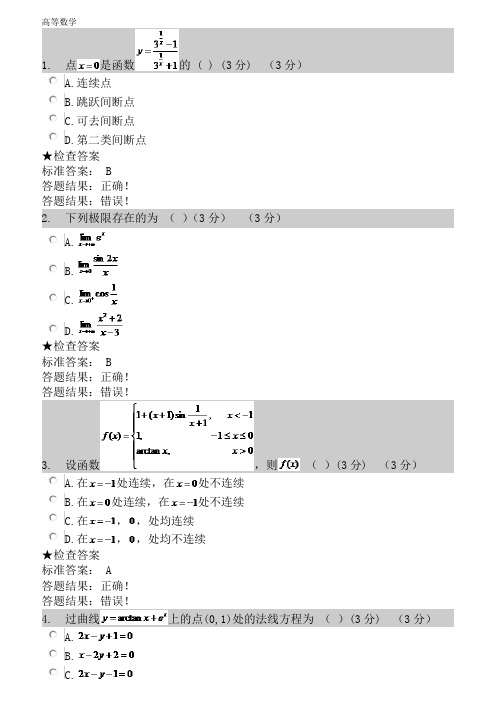
高等数学1. 点是函数的 ( ) (3分) (3分)A.连续点B.跳跃间断点C.可去间断点D.第二类间断点★检查答案标准答案: B答题结果:正确!答题结果:错误!2. 下列极限存在的为()(3分)(3分)A.B.C.D.★检查答案标准答案: B答题结果:正确!答题结果:错误!3. 设函数,则()(3分) (3分)A.在处连续,在处不连续B.在处连续,在处不连续C.在,,处均连续D.在,,处均不连续★检查答案标准答案: A答题结果:正确!4. 过曲线上的点A.B.C.★检查答案标准答案: D答题结果:正确!答题结果:错误!5. 设函数由参数方程确定,则()(3分) (3分)A.-2B.-1C.D.★检查答案标准答案: D答题结果:正确!答题结果:错误!6. 设,则()(3分)(3分)A.0B.C.1D.2★检查答案标准答案: B答题结果:正确!答题结果:错误!7. 曲线的拐点是() (3分) (3分)A.B.C.无拐点D.★检查答案标准答案: B答题结果:正确!若函数,则A.B.D.★检查答案标准答案: B答题结果:正确!答题结果:错误!9. 函数在区间内()(3分)(3分)A.单调递增且图像是凹的曲线B.单调递增且图像是凸的曲线C.单调递减且图像是凹的曲线D.单调递减且图像是凸的曲线★检查答案标准答案: C答题结果:正确!答题结果:错误!10. 函数的单调减区间是()(3分)(3分)A.B.C.D.★检查答案标准答案: C答题结果:正确!答题结果:错误!11. 下列广义积分收敛的是()(3分)(3分)A.B.C.D.★检查答案标准答案: C答题结果:正确!答题结果:错误!12. 设区域D由所围成,则区域D的面积为()(3分)(3分)A.B.C.D.★检查答案标准答案: D答题结果:正确!答题结果:错误!13. 设D为圆周由围成的闭区域,则()(3分)(3分)A.B.2C.4D.16★检查答案。
2005年英语-成人高考高起点考试真题及参考答案
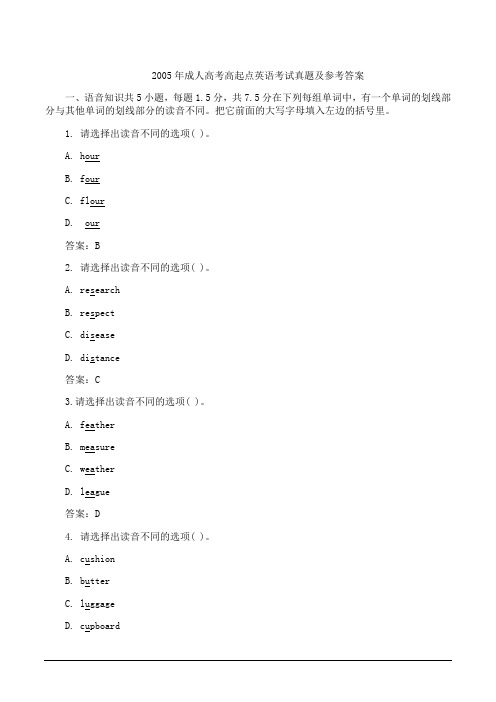
2005年成人高考高起点英语考试真题及参考答案一、语音知识共5小题,每题1.5分,共7.5分在下列每组单词中,有一个单词的划线部分与其他单词的划线部分的读音不同。
把它前面的大写字母填入左边的括号里。
1. 请选择出读音不同的选项( )。
A. hourB. fourC. flourD. our答案:B2. 请选择出读音不同的选项( )。
A. researchB. respectC. diseaseD. distance答案:C3.请选择出读音不同的选项( )。
A. featherB. measureC. weatherD. league答案:D4. 请选择出读音不同的选项( )。
A. cushionB. butterC. luggageD. cupboard答案:A5. 请选择出读音不同的选项( )。
A. chimneyB. chickenC. chemistryD. chairman答案:C二、词汇与语法知识共15小题;每题1.5分,共22.5分。
从每小题的四个选择项中,选出最佳的一项,并把它前面的大写字母填入左边的括号里6. I arranged to meet Mr. Jones here. I hope I haven’t ______ him.A. forgottenB. missedC. lostD. passed答案:B7. They have three reasons for keeping their marriage ______ secret for _____ moment.A. a; 不填B. the; aC. 不填; theD. a; the答案:D8. Not until very late that afternoon ______ the news that his daughter won the match.A. did the father getB. the father gotC. the father did getD. got the father答案:A9.Something must be done immediately if these wild animals ______ saved.A. will beB. wereC. are about to beD. are to be答案:D10. Michael _____ to pass the examination at his second attempt.A. succeededB. completedC. realizedD. managed答案:D11. – My watch stopped.-- You ______ have forgotten to wind it.A. shouldB. mustC. canD. may答案: B12. Helen made ____to visit her parents once a month, but she didn’t keep it.A. an offerB. a decisionC. an effortD. a promise答案:A13. Don’t worry about Susan; she just feels like _____ home alone tonight.A. to stayB. stayC. stayingD. having stayed答案:C14. Neither my wife nor I ______ able to persuade our daughter to change her mind.A. amB. areC. have beenD. is答案:A15. This is the washing machine ____ we have had so much trouble.A. at whichB. with whichC. of whichD. in which答案:B16. Mary has a lot of letters to write today. She ___ all afternoon and she _____ yet.A. has been writing; hasn’t finishedB. has written; hasn’t finishedC. writes; doesn’t finishD. wrote; didn’t finish答案:A17. As we knew, Xu HaiFeng won the first gold medal for China at the 23rd Olympic Games____ in Los Angeles.A. being heldB. to be heldC. having been heldD. held答案:D18. The driving test was difficult for me, but I finally ____ it.A. got back toB. got along withC. got throughD. got into答案:C19. – Why are you so late, Jim?-- Sorry. We _____ in heavy traffic for about an hour.A. have stuckB. are stuckC. stuckD. were stuck答案:D20. The teachers decided to put off the meeting till next week, ___ they won’t be so busy.A. sinceB. asC. whenD. while答案:C三、完形填空共20小题;每题1.5分,共30分通读下面的短文,掌握其大意。
- 1、下载文档前请自行甄别文档内容的完整性,平台不提供额外的编辑、内容补充、找答案等附加服务。
- 2、"仅部分预览"的文档,不可在线预览部分如存在完整性等问题,可反馈申请退款(可完整预览的文档不适用该条件!)。
- 3、如文档侵犯您的权益,请联系客服反馈,我们会尽快为您处理(人工客服工作时间:9:00-18:30)。
《电磁场与电磁波》实验指导书李路编沈阳大学信息工程学院目录实验一熟悉MA TLAB仿真软件实验二等量同号点电荷电场实验三等量异号点电荷的电势分布实验四带电粒子在均匀电磁场中运动实验五使用m语言对电磁场的仿真实验六使用偏微分方程工具箱对电磁场的仿真课程编号:课程类别:学科必修课程适用层次:本科适用专业:通信工程课程总学时:48 适用学期:第4学期实验学时:12 开设实验项目数:6撰写人:李路审核人:周昕教学院长:范立南实验一:熟悉MATLAB仿真软件一、实验目的与要求1.了解MATLAB应用开发环境2.了解MATLAB的使用方法二、实验类型验证三、实验原理及说明掌握MATLAB的基本功能。
四、实验仪器序号名称主要用途1 一台安装Windows2000的pc机。
计算机的具体要求:⒈Pentium3以上的CPU;⒉建议至少256MB的内存;⒊建议硬盘至少20GB4.安装MATLAB仿真软件。
运行MATLAB仿真软件。
五、实验内容和步骤在Windows窗口中用鼠标双击MA TLAB图标即可进入MA TLAB的工作窗口(Command Window),如图1所示。
没有图标可利用MA TLAB\bin目录下的MATLAB.exe文件在桌面上建立一个快捷方式。
图1 MA TLAB工作窗口退出MA TLAB的方法有三种:单击工作窗口右上角的关闭按钮;用菜单 MATLAB 命令;或者直接在工作窗口中输入quit后回车。
工作窗口是标准的Windows窗口形式,用户在命令窗口中输入各种指令,进行运算;在左侧的变量窗口中监控当前所创立的所有变量。
Current Directory是系统的当前工作路径,MA TLAB对函数或文件等进行搜索,用户每次文件的创建、保存都在这个路径下进行。
初次启动MA TLAB时系统的默认工作路径是MA TLAB目录下的Work子目录,如果要改变当前的工作路径,可以单击如图2所示的路径栏右侧的,在弹出的路径选择对话框内选择想要设置的路径。
图2 工作路径栏和选择工作路径对话框六、实验数据处理与分析1MATLAB系统基本有哪五个主要部分?2MATLAB的符号运算变量如何创建?实验二:等量同号点电荷电场一、实验目的与要求1.学习了解MATLAB数据表示、运算符和表达式;2.掌握等量同号点电荷电场的分布情况。
二、实验类型设计三、实验原理及说明MATLAB输入命令的方式有两种,一种就是在命令窗口中直接输入简单的语句,这种方式适应于命令比较简单、且处理的问题没有普遍应用性、差错处理比较简单的场合。
但是在进行大量重复性的计算时,或者语句结构比较复杂需要进行流程控制时,这种方式就不够灵活。
出现了另一种输入命令的工作方式:M文件的编程工作方式。
M文件是一个简单的文本文件,语法比一般的高级语言都简单,程序容易调试,交互性强;而且可以像一般文本文件那样在任何文本编辑器中进行编辑、存储、修改和读取(输入时用英文)。
这里用由MA TLAB语句构成的程序文件(称作m文件,其扩展名为.m)进行编程设计。
MATLAB提供一个方便实用的M文件编辑器,利用它,用户可以完成程序的创建、编辑、调试、存储和运行等工作。
在MATLAB命令窗口中输入“edit”并回车,或者新建一个m-file文件,调出如下图所示的M文件编辑器(编辑窗口)。
序号名称主要用途1 一台安装Windows2000的pc机。
计算机的具体要求:⒈Pentium3以上的CPU;⒉建议至少256MB的内存;⒊建议硬盘至少20GB4.安装MATLAB仿真软件。
运行MATLAB仿真软件。
五、实验内容和步骤(一)建立等量同号点电荷电场的电场线方程首先建立电场线的微分方程(二维情况),因为电场中任一点的电场方向都沿该电场线的切线方向,所以满足:例如,这里假设二点电荷位于(-2,0)和(2,0),二点电荷“电量”为q1和q2(均等于10),由库仑定律和电场的叠加原理,得出下列微分方程:解此方程就可以绘出电场线。
(二)使用M文件编辑器,编程实现同号点电荷电场线的绘制这里令y是微分方程的解矢量,它包括两个分量,y(1)表示x ,y(2)表示y ,解出y后就得到了x与y的关系,即可依次绘制出电场线。
当使用绘图语句时,MATLAB就自动打开一个图形窗口;如果已经有图形窗口存在,作图命令便会使用已存在的图形窗口。
如果使用命令figure,就会打开一个新的图形窗口。
每个图形窗口的标题栏都会有一个编号n ,打开第n个图形窗口的指令是figure(n) ;在已有图形上继续作图的指令是hold on ;取消这种功能的指令是hold off 。
图形窗口如图所示。
在图中,上端是菜单栏,选择tools菜单中Show Toolbar命令可以显示工具栏的图标。
各图标的含义分别是新建、打开、保存和打印文件,编辑图形、加注文字、画箭头和画直线,放大、缩小和旋转图形。
在按下工具栏上的“鼠标箭头”后,可以对当前的图形对象的各种属性(颜色、线宽、坐标格式、标志等)加以编辑。
File菜单下的“选项”(Preferences)可以改变图形窗口的各种功能,如数据格式、字体,图形存储的格式等。
举例编写函数文件dcx1fun.m ,再编写主程序dcx1.m ,如下。
在命令窗口中键入dcx1,并回车即可实现,二点电荷位于(-2,0)和(2,0)同号点电荷电场线的绘制。
(三)要求动手设计一个二点电荷位于(-1,0)和(1,0) ,同号点电荷电场线的绘制程序,并画出绘制图形。
六、实验数据处理与分析(一)数据格式及表示MATLAB使用常规的十进制表示法,小数位数不限,可以用加号和减号表示正负数。
10的幂用e加上数字表示。
虚数单位是i和j ,数字后直接加上i或j表示虚数,中间不要有空格或者乘号;但表达式中要在变量名和虚数单位间加上*号。
以下都是合法的数值表示法。
(二)运算符和操作符(1)一般运算符单个数据的运算有加、减、乘、除、幂和括号,所用的算符分别是:+ - * / ^ ( )(2)操作符冒号“:”此符号在矩阵(数组)的构造和运算中非常有用,可以用来产生矢量(数组),其基本用法有:j:k 等价于[j,j+1,……,k] 若j>k则返回空值j:i:k 等价于[j,j+i,j+2*i,……,k] 若i>0则要求j<k,i<0则要求j>k,否则返回空值。
此外,冒号还可以用作矩阵的下标,以及部分的选择矩阵的元素,执行循环操作等。
百分号“%”此符号在命令行中表示注释,即在一行中百分号后面的语句都被忽略而不被执行。
连续点“…”如果一条命令很长,一行容不下,可以用3个点加在一行的末尾,表示此行未完,而在下一行继续。
分号“;”用在每行命令的结尾,要求执行命令但不显示计算结果。
(3)关系运算符关系运算符主要用于在数与数、矩阵与矩阵之间进行比较,基本的有(4)逻辑运算符在MATLAB中包含与“&”、或“|”、非“~”、异或“xor”四种逻辑运算符。
(三)变量与表达式用运算符把数字、变量和函数组合在一起,就建立了一个表达式。
例如X0=abs(sin(randn))。
在MA TLAB中,一个变量可以通过给它分配一个数值或表达式来定义,如下所示:variable = expression一个变量的值可以通过输入它的名字=值(或表达式),并按回车键获得,MATLAB 以显示这个变量的名字和值作为回答。
如果这个变量并不存在,就显示一个错误信息,如图所示。
图6 显示变量在expression之后可以加分号后按回车键,也可以直接按回车键。
没有结尾分号的每个命令在屏幕上显示出其结果;若结尾带分号,就执行计算,但计算结果并不显示。
如果不指定变量而直接输入expression项,则MA TLAB用ans(answer的缩写)显示这个值。
七、预习与思考题1、MA TLAB输入命令的方式有哪些?2、什么是M文件?实验三:等量异号点电荷的电势分布一、实验目的与要求1.掌握命令窗口中直接输入语句,进行编程绘制等量异号点电荷的电势分布图;2.掌握二维网格和三维曲面绘图的语句。
二、实验类型设计三、实验原理及说明这里在命令窗口中直接输入简单的语句进行编程设计。
MATLAB有几千个通用和专用的函数文件。
四、实验仪器五、实验内容和步骤(一)建立等量异号点电荷的电势方程物理情景是oxy平面上在x=2,y=0处有一正电荷,x= -2,y=0处有一负电荷,根据计算两点电荷电场中电势的分布,由于(二)利用MA TLAB的函数, 绘制等量异号点电荷的电势分布图首先选定一系列的x和y后,组成了平面上的网络点,再计算对应每一点上的z值。
例如-5:0.2:5,-4:0.2:4分别是选取横坐标与纵坐标的一系列数值,meshgrid是生成数据网格的命令,[x,y]是xy平面上的坐标网格点。
z是场点(x ,y)的电势,要求写出z的表达式。
这里用到MATLAB的函数mesh()描绘3D网格图,meshgrid()描绘在3D图形上加坐标网格,sqrt()求变量的平方根。
mesh()是三维网格作图命令,mesh(x,y,z)画出了每一个格点(x,y)上对应的z值(电势)。
在命令窗口中直接输入简单的语句,如下。
解1解2当场点即在电荷处时,会出现分母为零的情况,因此在r里加了一个小量0.01,这样既可以完成计算,又不会对结果的正确性造成太大影响。
另外需要注意的是表达式中的“./ ”、“.^ ”是对数组运算的算符,含义与数值运算中的“./ ”、“.^ ”相同,不同之处是后者只对单个数值变量进行运算,而前者对整个数组变量中的所有元素同时进行运算。
解2为了减少计算量,增加精确度,与先前的示例相比,计算范围由原先的-5<x<5 ,-4<y<4改为-2<x<2 ,-2<y<2 ;步长由0.5改为0.1,电荷位置也改在(-1,0)和(1,0)处。
(三)要求在命令窗口中输入相应语句,设计一个二点电荷位于(-3,0)和(3,0) ,等量异号点电荷电势分布图的程序,要求用解1、2两种方法分别实现,并画出绘制图形。
六、实验数据处理与分析contour是绘制等高线的函数,以z为对象,则绘出的就是等势线。
quiver是绘制点[x,y]处的矢量[px,py],即画出各点电场的大小和方向gradient是取梯度函数。
七、预习与思考题1.二维网格和三维曲面绘图的各有哪些函数?实验四:带电粒子在均匀电磁场中运动一、实验目的与要求1.掌握m文件,进行编程绘制带电粒子在均匀电磁场中的运动轨迹图;2.掌握利用函数ode23( ) 求解微分方程组;3.掌握三维曲面绘图和彗星轨迹图的语句。
二、实验类型设计三、实验原理及说明(一)三维曲线的作图命令三维曲线的作图命令为plot3(x,y,z,s)其中x,y,z是同维数的矢量或矩阵,每组x,y,z构成一个点的坐标,各点依次相连,形成一条曲线。
